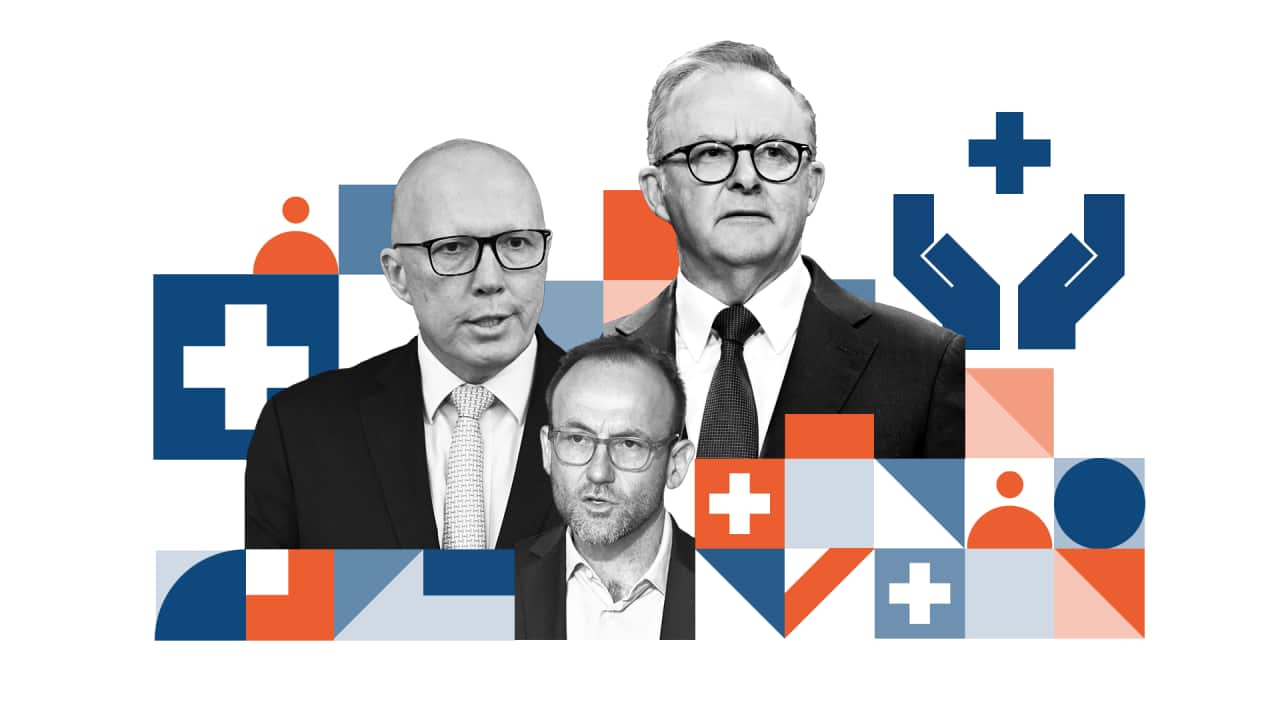From Medicare funding to mental health support and medicine affordability, here's what the Labor, the Coalition and Greens have promised ahead of the 3 May federal election.
Labor’s plan: Medicare, mental health and cheaper medicine
Medicare is at the centre of Labor's re-election campaign, promising an $8.5 billion boost aimed at strengthening the system and incentivising more clinics to bulk bill.
This includes $3.5 billion in direct incentives to GPs and medical centres, and $400 million for training more nurses and doctors in primary care settings, outlined in .
Labor also says it will expand urgent care access, with to open by June 2026 on top of the 87 already operating.
The rollout will cost $644 million.
Labor also says it will (down from $31.60). The cost would remain $7.70 for concession cardholders — a rate Labor has frozen until 2030.
The party also made $573 million women's health announcement ahead in February. As part of that, some women undergoing IVF now have earlier access to a medication that was previously only funded by the (PBS) in later cycles. An oral contraceptive and endometriosis will be added to the PBS from 1 May. Also pledged was funding for 11 new endometriosis clinics; improved menopausal care through a new Medicare rebate for health assessments and the listing of medications on the PBS; better access to IUDs and birth control implants, among other things.
- $225 million for 31 new and upgraded Medicare mental health centres
- More than $200 million for 58 new, upgraded or expanded Headspace services
- $500 million for 20 youth specialist care centres for young people with complex needs
- $90 million for more than 1,200 training places for mental health professionals and peer workers
Coalition’s plan: Matching Medicare and mental health funding
The Coalition says it will match Labor's $573 million women's health and $8.5 billion Medicare packages, and its $25 price cap pledge on PBS medicines.
It says the $8.5 billion Medicare pledge would build on an earlier $500 million commitment to increase the number of Medicare-subsidised mental health sessions from 10 to 20. During COVID, the Coalition government increased the number of subsidised psychology sessions by the same amount, but Labor reduced them to the pre-COVID level after winning the 2022 election.
The Coalition has also promised a $5 million review into women-specific items on the Medicare Benefits Schedule and PBS to ensure affordable access.
The Coalition says it wants to place "Australia at the forefront of youth mental health treatmen in the world".
It has pledged a $400 million investment into youth mental health services, and says it will expand the National Centre for Excellence in Youth Mental Health.
The Greens’ plan: Medicare for mental and dental health
The Greens have positioned themselves as the only major party proposing a major expansion of Medicare, with a policy to include fully subsidised dental and mental health services.
Their $195 billion Medicare investment would make dental visits and mental health care available through the public system with no gap fees — a reform the party says is essential to health equity.
On mental health, the Greens have pledged:
- Funding of $400 million in grants for community mental health organisations
- Creating a systematic approach to suicide prevention by legislating a National Suicide Prevention Act with a $180 million investment to ensure alignment across all levels of government
- Ensure safe and culturally responsive mental health care by investing $15 million to train all mental health practitioners in gender affirmation, anti-discrimination, and cultural responsiveness.
The Greens have also promised:
- Free ADHD and Autism assessments under Medicare
- Increase access to medicinal cannabis by allocating $10 million over 2 years to fund a working group to investigate listing medicinal cannabis on the PBS
- Commit $2 million to fund a review of the accessibility of telehealth services
- $30.6 billion in local public hospitals nationwide.
The Greens also support restoring the 20 Medicare-subsidised psychology sessions.

